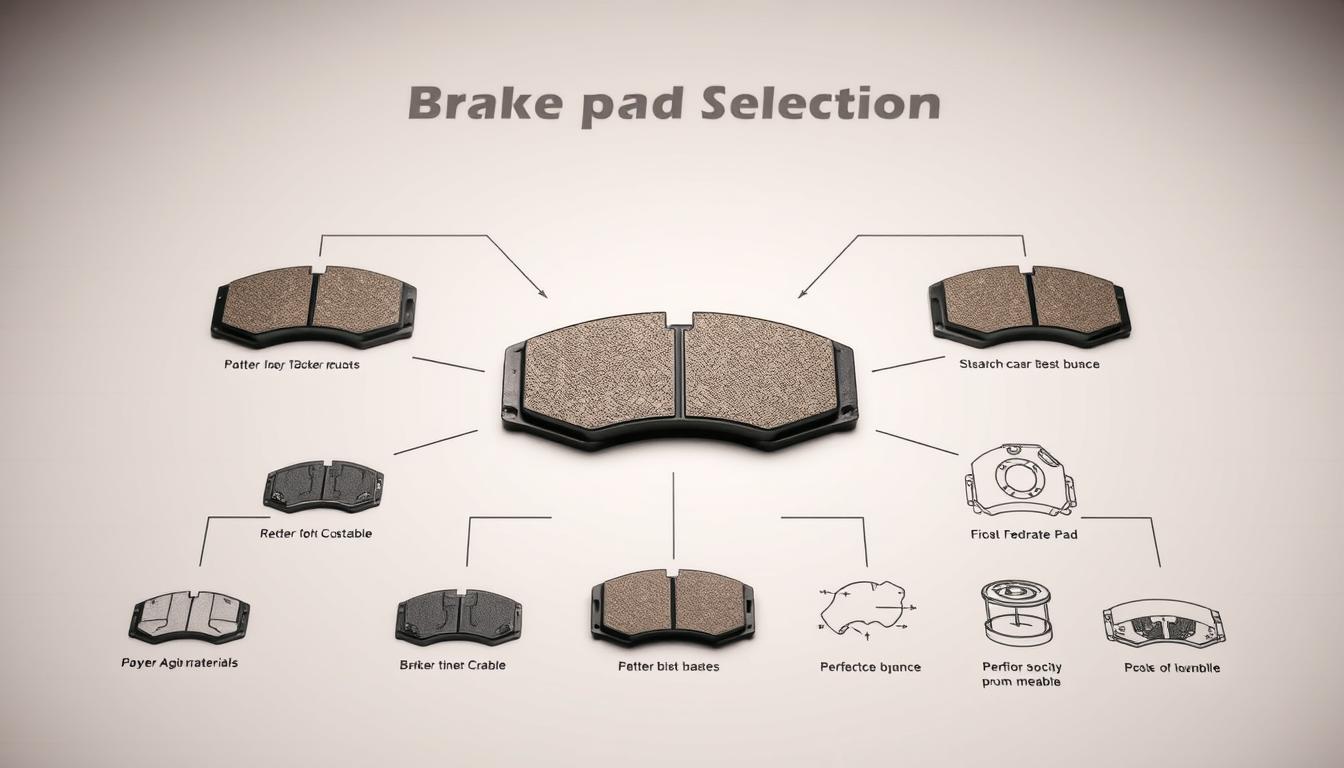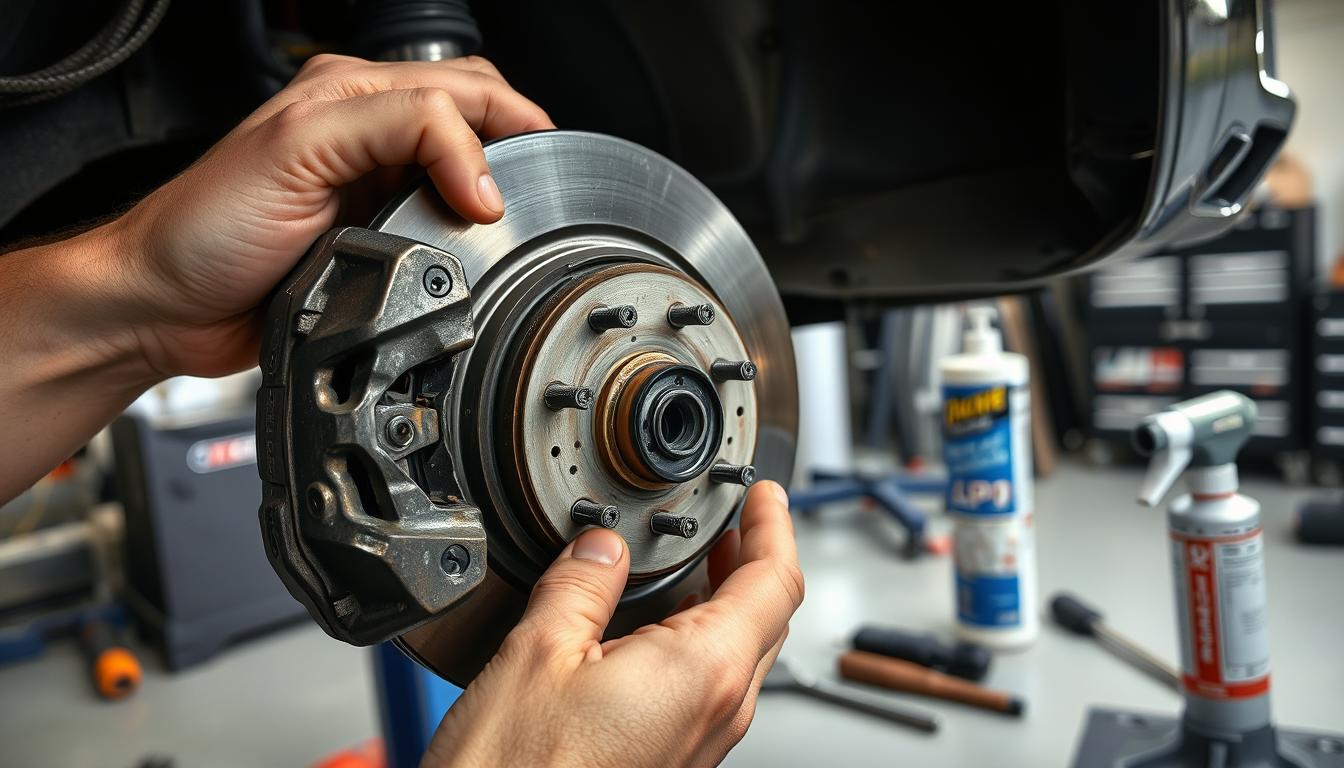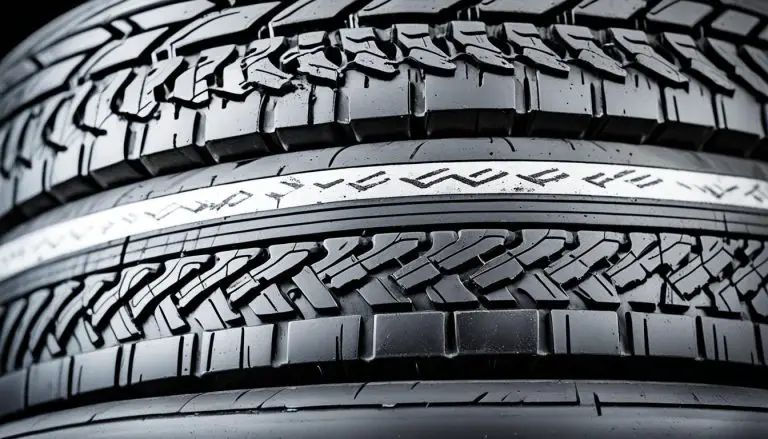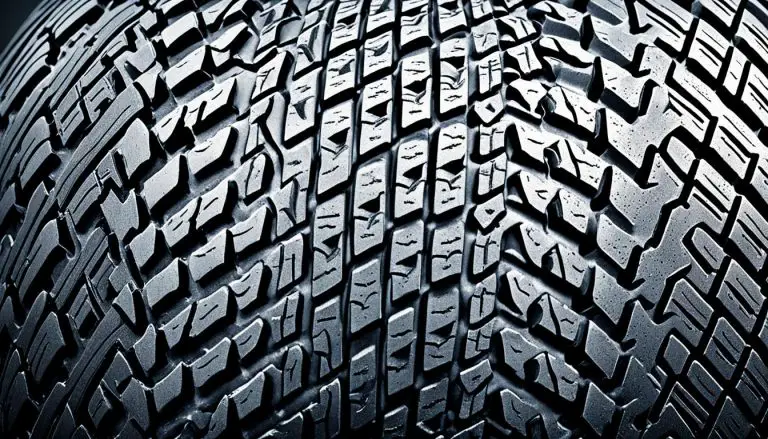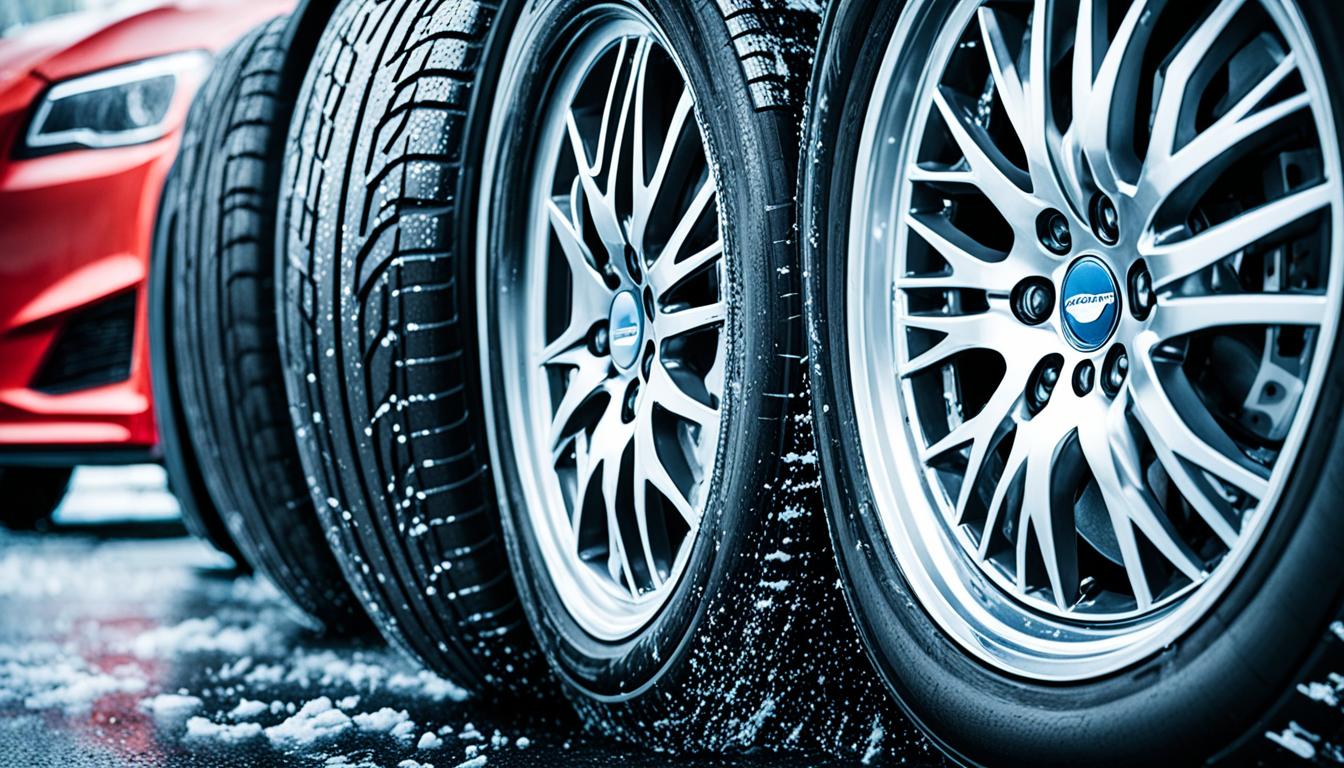
Did you know all-season tires last for about 60,000 miles, but summer tires only go for roughly 25,000 miles? This vast gap in mileage is key when deciding on the right tires. It forms just one part of the complex choice between these two tire types.
Choosing between all-season and summer tires means grasping their unique strengths. All-season tires aim to perform well in all weathers, making them ideal for areas with moderate winters and summers. Conversely, summer tires excel in warm, dry or slightly wet environments, providing superior grip and handling. However, they lose efficiency in temperatures below 44 degrees Fahrenheit.
When making the tire selection, your driving habits, local climate, and your car’s needs play a crucial role. Understanding what each tire excels at and what it lacks helps in making the best choice. This choice ensures safety and comfort throughout the year.
Introduction to All-Season and Summer Tires
Tires serve varied needs, tailored for specific driving contexts. There are two key tire types: all-season and summer. Each type is engineered with different weather and road conditions in mind, offering unique benefits.
Overview of Tire Types and Their Purposes
Summer tires, also known as performance tires, prioritize excellent grip, handling, and responsiveness in both dry and rainy conditions. They shine in warm weather, giving drivers precise control and top cornering skills. In contrast, all-season tires aim for a balanced performance, proving adequate in wet, dry, and slightly snowy conditions. However, they lag behind summer tires in extreme warm condition performances.
| Tire Type | Tread Compound | Temperature Range | Wet Performance | Dry Performance | Tread Life |
|---|---|---|---|---|---|
| Summer Tires | Soft, Sticky Rubber | Above 7°C (45°F) | Excellent Grip | Excellent Handling | Less than 10,000 miles |
| All-Season Tires | Balanced Compound | Versatile (Suitable Year-Round) | Acceptable Grip | Acceptable Handling | 20,000 miles or more |
The selection between all-season and summer tires hinges on driving habits, local climate, and vehicle use. Enthusiasts valuing peak performance might choose summer tires, despite their shorter lifespan and limited seasonal use. Meanwhile, those looking for versatility, durability, and a more balanced performance would lean towards all-season tires.
What Are Summer Tires?
Summer tires, known as performance tires, excel in warm, dry conditions. They sport a special tread and rubber compound for improved grip and handling. This design boosts performance on hot, dry roads. For those who value top-tier performance, especially in high-performance cars, summer tires are the go-to choice.
Characteristics and Design of Summer Tires
Summer tires stand out with distinct characteristics. They have shallower grooves and solid ribs, which puts more rubber on the road. This, paired with their unique rubber, keeps them flexible for better grip in the heat. Because of this, summer tires effectively manage warm weather conditions and escape heat buildup more than their counterparts.
Benefits of Summer Tires in Warm Weather
- Improved traction and grip on dry roads, enabling precise handling, cornering, and acceleration
- Enhanced wet weather performance, with better resistance to hydroplaning at higher speeds
- Excellent braking capabilities, reducing stopping distances in both wet and dry conditions
- Increased responsiveness and a more connected, engaging driving experience
- Optimized for warm temperatures, providing maximum performance in hot climates
Summer tires cater to driving enthusiasts and owners of high-performance vehicles. They offer unparalleled grip, handling, and agility in warm conditions. For those who love spirited driving, summer tires’ unique design and compounds make them unbeatable. These drivers choose performance over the year-round use that all-season tires provide.
For a deep dive into the contrast between summer and all-season tires, browse these enlightening resources: Bridgestone Tire, Les Schwab, and Tires Plus.
Why Summer Tires Perform Better in Heat and Rain
As the mercury rises and pavement heats up, summer tires stand out. Their design leverages special rubber compositions, ideal for hot conditions, which boost performance. With shallow grooves and solid ribs, they increase contact with the road. This gives them a superior grip, be it under the rain or a clear sky.
Summer tires feature a softer and pliable rubber. This material handles heat exceptionally well. It’s the top pick for those who love summer driving. Moreover, their unique tread design is excellent at pushing water away. Thus, they excel at preventing hydroplaning.
The benefits of using summer tires in the heat and rain are evident:
- They offer superior handling and grip for swift turns at high speeds.
- Stopping in the rain improves thanks to their better traction and braking.
- They are less prone to hydroplaning, keeping wet road control safe.
- They last long while efficiently dissipating heat in summer.
Suiting both serpentile mountain routes and watery conditions, summer tires are the enthusiasts’ choice. They are unbeatable for extracting the most out of your vehicle in hot climate adventures.
| Tire Type | Performance in Heat | Wet Traction | Hydroplaning Resistance |
|---|---|---|---|
| Summer Tires | Excellent | Excellent | Excellent |
| All-Season Tires | Good | Good | Good |
| Winter Tires | Poor | Poor | Poor |
All-Season Tires: A Balanced Approach
All-season tires are a go-to option for drivers dealing with various road and weather conditions throughout the year. Engineered for versatility, they offer a balanced performance. This meets the demands of daily drivers encountering different conditions from sunny days to snowy nights.
Advantages of All-Season Tires for Various Conditions
In contrast to specialized tires, such as summer or winter tires, all-season all-season tires perform reasonably well in many conditions. They feature a unique rubber designed to stay flexible just above freezing, ensuring grip on light snow and ice. Yet, they also have traction on dry, hot pavement.
The symmetrical tread pattern found in all-season tires further boosts their adaptability. It promotes even wear by allowing for diverse rotation methods. This key design element helps maximize all-season tire performance and longevity.
All-season tires fall between the exceptional performance of summer tires in heat and winter tires in snow and ice. Nonetheless, they excel at striking a critical balance. They are perfect for drivers facing a mix of mild winter conditions and the occasional snowfall throughout the year.

Choosing all-season all-season tires is a sound decision for those valuing a tire that performs well in all conditions. It ensures a smooth and confident drive all year round, no matter the weather. This makes them a preferred option for many.
Summer Tires vs. All-Season Tires: A Comparison
Choosing the right tires for your car greatly impacts how it handles. The decision between summer and all-season tires varies based on your preferences and the driving environments you face. Each type has unique features designed for specific conditions.
Wet Performance and Hydroplaning Resistance
Summer tires are built to avoid hydroplaning, thanks to their sticky rubber and unique patterns. They provide the best grip on wet surfaces, offering security and quick response when faced with rain. All-season tires, while decent in the wet, aren’t as effective in preventing hydroplaning as summers.
Dry Performance and Handling
For dry roads, summer tires outperform all seasons with their precise handling. They’re crafted for sharp turns, speedy acceleration, and short braking distances. This combination makes driving on them exciting and dynamic. All-season tires, on the other side, aim for versatility over high-level sportiness.
Temperature Range and Tread Life
Summer tires suit hot weather best, withstanding 44°F and above. They lose efficiency in cold, making them unsafe for those conditions. All-season tires cover a wider range, working from just above freezing to warm temperatures. However, they last fewer miles than summer tires.
Summer tires offer top performance in both wet and dry situations but in warm weather only. All-season tires provide a more versatile choice, fitting many weather types but with less dynamic responses. Your selection should be based on your area’s climate, how you drive, and what you like from your car.
To find the best tires for your vehicle and needs, talking to experts is key. They can guide you to the ideal tire for your car and the conditions you face.
all-season tires vs. summer tires
Choosing between all-season and summer tires is more than just picking what fits your vehicle. It’s about finding the best match for your driving conditions. Each tire type shines under specific situations, offering benefits and compromises. To make the right choice, understanding their distinct features is key.
All-season tires are meant to serve well in various climates, from wet to dry, and even mildly snowy roads. They boast a wide temperature tolerance and last longer. Thus, they are a favorite among many motorists. Summer tires, designed for warmer weather and rain, aim for top-notch performance. They give exceptional grip when turning, braking, and speeding. This makes them ideal for sporty cars and driving enthusiasts.
| Feature | All-Season Tires | Summer Tires |
|---|---|---|
| Wet Performance | Acceptable | Excellent |
| Dry Performance | Good | Exceptional |
| Temperature Range | Broad (suitable for year-round use) | Narrow (optimized for warm weather) |
| Tread Life | Longer (30,000 to 45,000 miles) | Shorter (8,000 to 12,000 miles) |
| Speed Rating | Up to 149 mph | Up to 186 mph |
The Michelin Pilot 4 All Season tire triumphs over summer tires, like the Pirelli PZero, in grip tests. For around-the-year traction, all-season models such as the Continental Extreme Contact DWS06 Plus AS are highly recommended.
Summer tires truly stand out in warm and wet weather, offering unmatched handling and braking. Yet, their performance dips in cold temperatures or snow. On the contrary, all-season tires strike a good balance in various conditions, making them a popular choice.
The best tire option depends on your area’s weather, how you drive, and what you find crucial in a tire’s performance. Summer tires suit sport car enthusiasts better, while all-season are a go-to for those prioritizing versatility throughout the year.
Choosing the Right Tires for Your Vehicle
When choosing between summer and all-season tires, many variables come into play. Your decision depends on where you live, how you drive, and your vehicle type. Knowing these aspects helps you pick the perfect tires for your specific needs.
Climate
In places with warm weather year-round and little snow, summer tires shine. They boast top-notch grip and handling in dry heat. Yet, if your area sees various seasons, including light snow or ice, all-season tires might be more useful.
Driving Style
For a thrilling ride focused on performance, summer tires are ideal. They improve how your car responds, turns, and handles. This makes them a common choice for those with sports cars or high-end models. But, if a balanced driving feel is of more importance, all-season tires could be better.
Vehicle Type
Summer tires are perfect for high-end vehicles, such as luxury SUVs and sports cars, needing premium handling. For everyday cars, SUVs, and light trucks, all-season tires deliver a more versatile option.
Considering these factors ensures you make a smart tire choice for a safe and pleasant drive, no matter the weather.
When to Use Summer Tires
Summer tires, also known as performance tires, shine when the weather’s warm. They’re designed for use in areas where it rarely falls below 44°F. Offering outstanding grip in all areas, including cornering and acceleration, they’re the go-to for high-performance cars. Thrill-seekers love them for their responsive, exciting drive.
Yet, it’s crucial to switch to winter tires if you face freezing temps, snow, or ice. For safe and smooth winter driving, summer tires won’t cut it. They lack the special design needed for these tough conditions.
The key things to think about with summer tires involve:
- Climate and Temperature Ranges: They excel in warm, dry settings but fall short in the cold and wet.
- Driving Conditions: Perfect for high-speed, dry-road activities, but not ideal for everyday rainy or snowy situations.
- Vehicle Type: They’re the choice for sports cars and high-performance models, not so much for SUVs or family cars.
Gaining insight into when to use summer tires is essential. It means you’ll select the best tires for your vehicle’s top performance and safety. Whether cruising the city or hitting the track.
| Tire Type | Temperature Range | Typical Usage |
|---|---|---|
| Summer Tires | Above 44°F | High-performance driving, warm weather conditions |
| All-Season Tires | Across a wide temperature range | Year-round use, versatile in various weather conditions |
| Winter Tires | Below 44°F | Driving in snow, ice, and cold temperatures |

When to Use All-Season Tires
All-season tires serve those seeking a tire suitable for multiple weather types. They work well in mild rain, dry conditions, and light snow. Their design allows for decent functionality between temperatures just above freezing to hot summers. Often chosen for everyday vehicles, SUVs, and light trucks, they provide a mix of traction, comfort, and lasting tread life.
These tires aren’t as focused on a specific season as summer or winter tires, making them a sensible choice for those not facing severe winter often. For instance, in the Pacific Northwest, drivers might go year-round with all-season tires. They switch to summer ones for the driest periods. In Texas, all-season tires are favored for their occasional cold snaps, providing alternatives to snow driving for many.
Your choice on all-season tires hinges on where you live, how you drive, and what vehicle you have. For moderate weather areas, where neither the peak of summer nor winter tire performance is required, they present a good balance and economical option. By weighing the pros and cons of all-season tires, you can confidently select the best fit for your driving requirements.
FAQ
Q: What are the key differences between all-season tires and summer tires?
A: All-season and summer tires differ in design, intent, and performance. Summer tires offer superb grip and handling in warm and wet weather for high-performance vehicles. Conversely, all-season tires aim for a balanced mix. They perform adequately in various conditions, include light winter driving, and focus on lasting longer.
Q: When should I use summer tires?
A: Summer tires perform best in warm areas, remaining effective above 44°F. They shine in wet or dry conditions, perfect for spirited drivers or high-performance cars. Yet, in colder regions with snow or ice risks, winter tires are safer for cold months.
Q: When should I use all-season tires?
A: Choosing all-season tires suits those meeting mild rain, dry, and light snowy conditions. They deliver decent performance in a broad temperature range, from above freezing to summer heat. Ideal for common vehicles, SUVs, and light trucks, they offer balanced traction and comfort year-round for those not needing specialized tires.
Q: What are the advantages of all-season tires?
A: All-season tires provide decent overall performance in varied conditions, including light winter. Their tread remains flexible just above freezing, ensuring traction in snow and on warm days. Moreover, their design allows for even tread wear, enhancing longevity. They are a practical compromise for those not demanding the extreme features of summer or winter tires.
Q: What are the benefits of summer tires?
A: Designed for precision and control on wet and dry tracks, summer tires are ideal for warm, rain-sparse areas. They sport shallow grooves and solid ribs for ample road contact. This, along with a unique rubber compound, maintains grip and dissipates heat, providing a responsive driving feel. They truly shine in temperatures warmer than 44°F.
Q: How do summer tires perform better in heat and rain compared to all-season tires?
A: Summer tires excel in grip, cornering, and braking because of their specific patterns and materials. The greater rubber-to-road contact from their design enhances traction in both conditions. Their flexible rubber deals with heat better, and their tread evacuates water effectively, cutting down on the risk of hydroplaning.
Q: What factors should I consider when choosing between all-season tires and summer tires?
A: Consider the following when deciding between summer and all-season tires:
– Climate: Warm, dry locales favor summer tires, while areas with varied weather lean towards all-season options.
– Driving Style: For aggressive drivers or high-performance cars, summer tires may be preferred. All-season tires are better for general driving.
– Vehicle Type: Everyday cars, SUVs, and light trucks find all-season tires appropriate, while summer tires match high-end or sport vehicles better.

